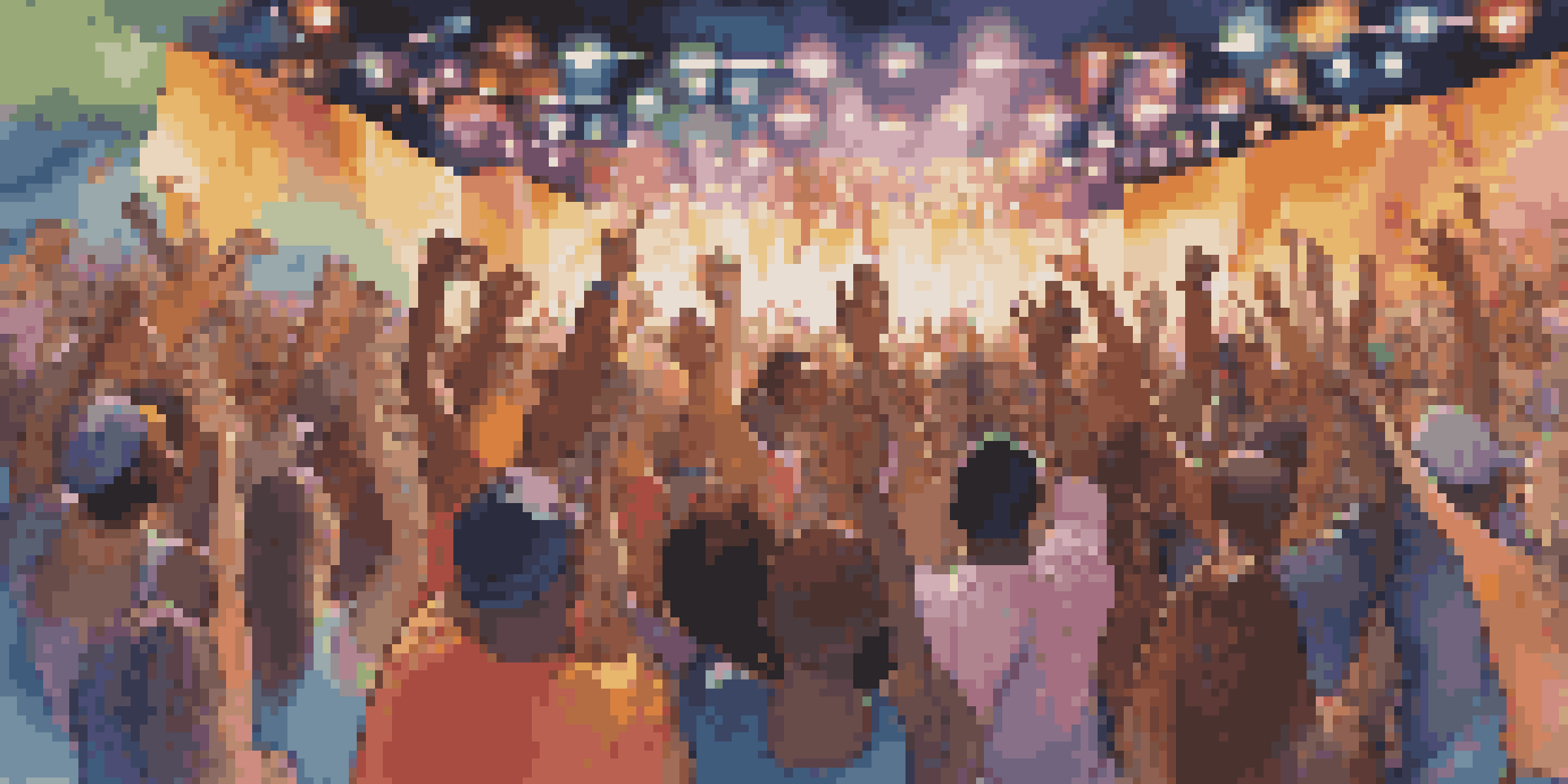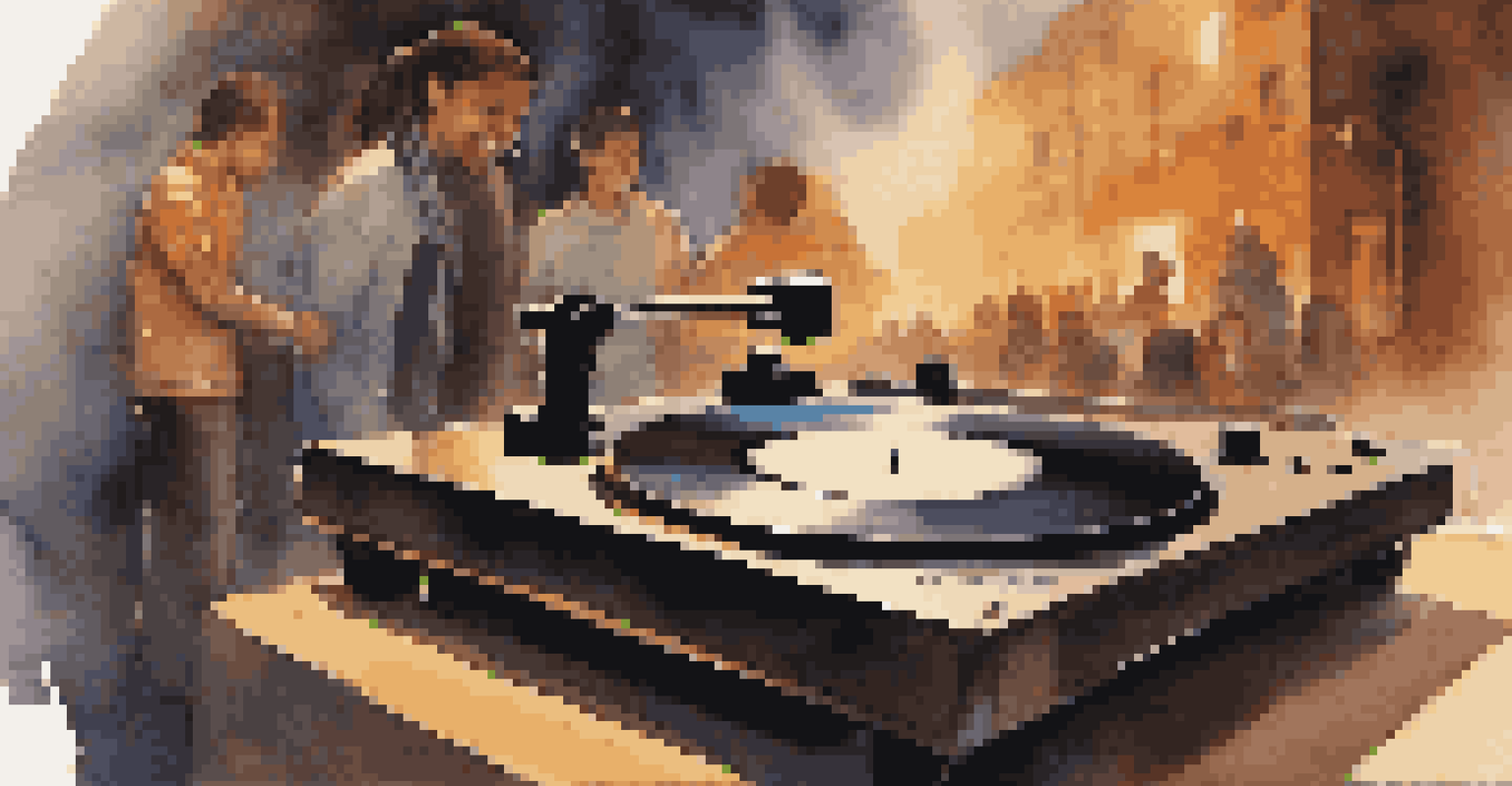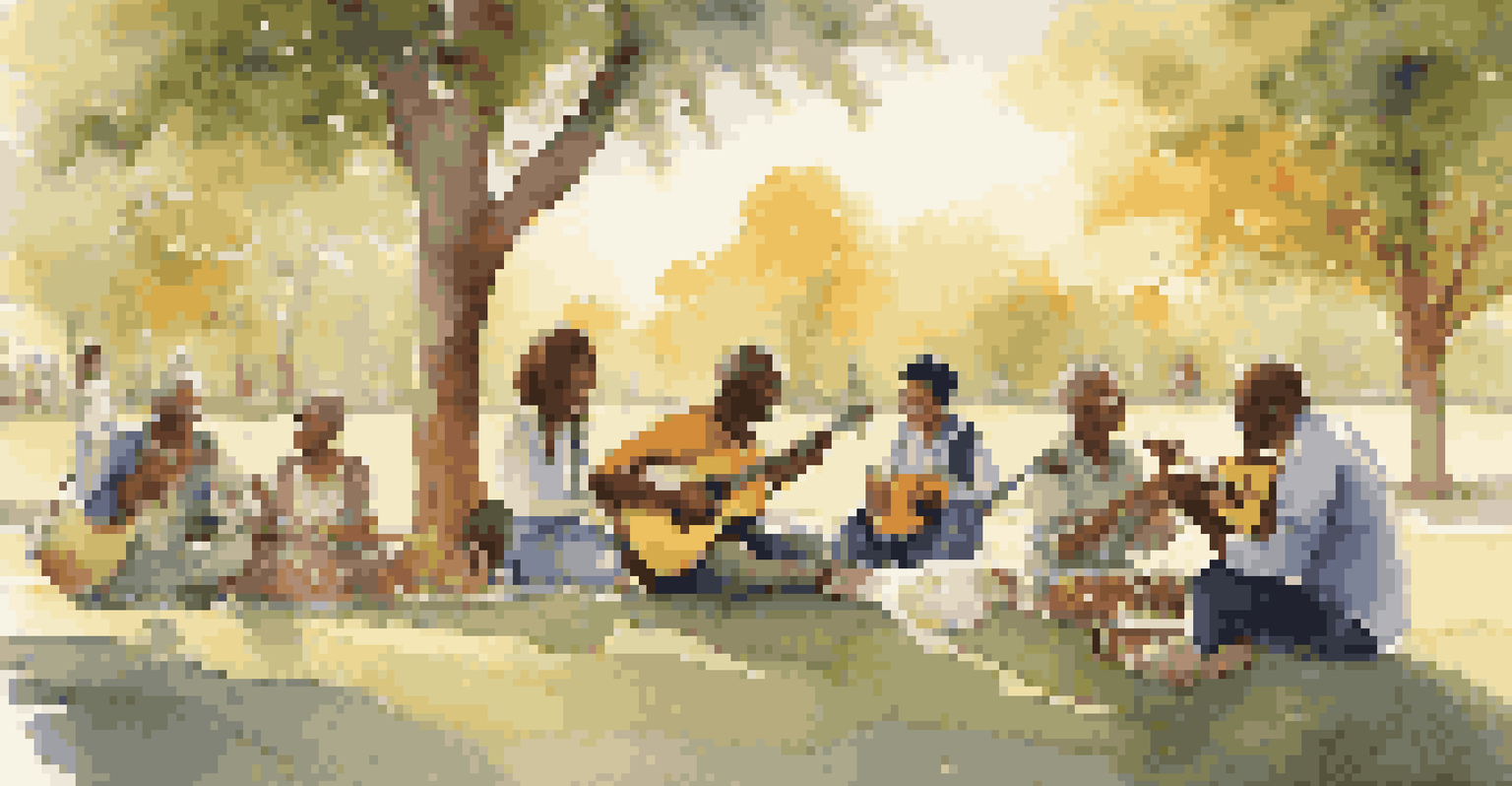The Connection Between Music and Racial Solidarity Movements

Music as a Universal Language of Unity and Resistance
Music has long been considered a universal language that transcends barriers, including race and culture. Throughout history, it has played a pivotal role in uniting people for common causes, especially during racial solidarity movements. This connection is evident in how songs evoke emotions and inspire collective action, making them powerful tools for social change.
Music can change the world because it can change people.
For example, during the Civil Rights Movement in the 1960s, songs like 'We Shall Overcome' became anthems of hope and resilience. These melodies not only expressed the struggles faced by African Americans but also rallied diverse groups to join the cause. The emotional pull of music fosters a sense of belonging, encouraging individuals to stand together against injustice.
Moreover, the act of singing together solidifies community bonds, creating shared experiences that fortify movements. Music, therefore, serves not just as entertainment but as a catalyst for collective identity and solidarity in the face of adversity.
Historical Context: Music in 20th Century Racial Movements
The 20th century was marked by significant racial struggles, and music became an integral part of these movements. From the Harlem Renaissance to the anti-apartheid struggle in South Africa, artists used their platforms to voice dissent and galvanize support. This historical context highlights how music has been a reflection of societal issues.

During the Civil Rights Movement, artists like Nina Simone and Sam Cooke used their songs to address the harsh realities of racial discrimination. Their music not only resonated with those directly affected but also reached wider audiences, spreading awareness and empathy. This ability to connect with listeners on an emotional level is what makes music such a powerful ally in the fight for racial equality.
Music Unites for Social Change
Music serves as a powerful tool that fosters unity and inspires collective action in racial solidarity movements.
As we look back, it’s clear that music has not only documented struggles but has also provided a soundtrack for hope and determination. This rich history continues to inspire new generations of artists who carry the torch for justice through their music.
Contemporary Artists Amplifying Racial Solidarity
Today, contemporary artists are harnessing the power of music to address ongoing racial injustices. Musicians like Kendrick Lamar and Beyoncé have been at the forefront, using their platforms to shed light on issues such as police brutality and systemic racism. Their lyrics often reflect personal experiences while also resonating with collective frustrations, fostering a sense of solidarity among listeners.
The power of music makes all the difference in the world.
Through powerful visuals and compelling narratives in their music videos, these artists amplify the messages of racial equality and justice. For instance, Beyoncé's 'Formation' not only celebrates Black culture but also critiques social injustices, encouraging listeners to take action. Such impactful work illustrates how music can be a form of protest and empowerment.
Furthermore, collaborations between artists from various backgrounds demonstrate the unifying potential of music in the fight for racial solidarity. These partnerships not only broaden the reach of important messages but also showcase the diversity within movements, illustrating that the fight for justice is a shared endeavor.
The Role of Music Festivals in Promoting Solidarity
Music festivals have increasingly become platforms for promoting racial solidarity and social justice. Events like Coachella and AfroPunk not only celebrate diverse musical talents but also emphasize the importance of inclusion and activism. These festivals often feature panels, workshops, and performances that raise awareness of racial issues and inspire collective action.
For example, AfroPunk is known for its focus on Black culture and social issues, providing a space for artists and attendees to engage in meaningful dialogue. The fusion of music and activism at these festivals creates an environment where solidarity can flourish, allowing participants to connect over shared values and experiences. This holistic approach fosters a sense of community that extends beyond the festival grounds.
Historical Influence on Movements
Throughout history, artists have used music to reflect societal struggles and galvanize support for racial equality.
Moreover, the visibility of these events can attract media attention, further amplifying important messages about racial solidarity. As attendees leave these festivals, they carry with them not just memories of music but also a renewed commitment to social justice.
Music as a Tool for Healing and Empowerment
Music has the power to heal, especially in the aftermath of racial trauma. For many, listening to or creating music serves as a form of therapy, providing an outlet for expressing emotions related to pain and struggle. This healing aspect is crucial for individuals and communities seeking to reclaim their narratives and find strength in solidarity.
Artists often channel their experiences into their music, creating a sense of catharsis that resonates with listeners. For instance, the genre of hip-hop has roots in storytelling and personal experiences, often addressing themes of struggle and resilience. This connection between personal narrative and collective experience fosters a sense of empowerment among those who relate to the messages conveyed.
Additionally, community music programs and workshops provide safe spaces for individuals to come together, share their stories, and create music that reflects their realities. This collaborative process not only nurtures creativity but also reinforces the importance of solidarity in the healing journey.
The Impact of Digital Platforms on Music and Solidarity
In today's digital age, social media and streaming platforms are reshaping how music promotes racial solidarity. Artists can share their messages with a global audience, breaking down geographical barriers that previously limited outreach. This accessibility allows for a diverse range of voices to be heard, amplifying the conversations around racial justice.
For instance, viral music challenges on platforms like TikTok can elevate songs that speak to racial issues, leading to increased awareness and activism. The rapid dissemination of music and messages through these channels has the potential to spark movements and unite people in solidarity across the globe. This phenomenon illustrates the power of technology in fostering connections.
Digital Platforms Amplify Voices
In the digital age, social media and streaming platforms enable artists to reach global audiences, enhancing the conversation around racial justice.
Moreover, digital platforms enable fans to engage directly with artists, creating a sense of community among supporters of racial justice. This interaction not only strengthens bonds but also encourages listeners to take proactive steps in their own communities, showcasing music's role as a catalyst for change in the digital landscape.
Conclusion: The Ongoing Relationship Between Music and Solidarity
As we reflect on the connection between music and racial solidarity movements, it’s clear that this relationship is both profound and enduring. Music has the unique ability to unite people, inspire action, and foster healing, making it an invaluable tool in the fight for justice. From historical anthems to contemporary hits, the power of music continues to resonate across generations.
The ongoing struggle for racial equality demands a collective effort, and music serves as a rallying point for individuals to come together. As artists create and share their stories, they not only document the struggles of their communities but also inspire others to join the fight. This continuous cycle of creation and activism reinforces the notion that music is not merely entertainment—it's a vital component of social change.

In conclusion, as we move forward, let us remember the power of music to connect us. Whether through the lyrics of a song or the rhythm of a beat, music will always have a place in the hearts of those striving for racial solidarity and justice.